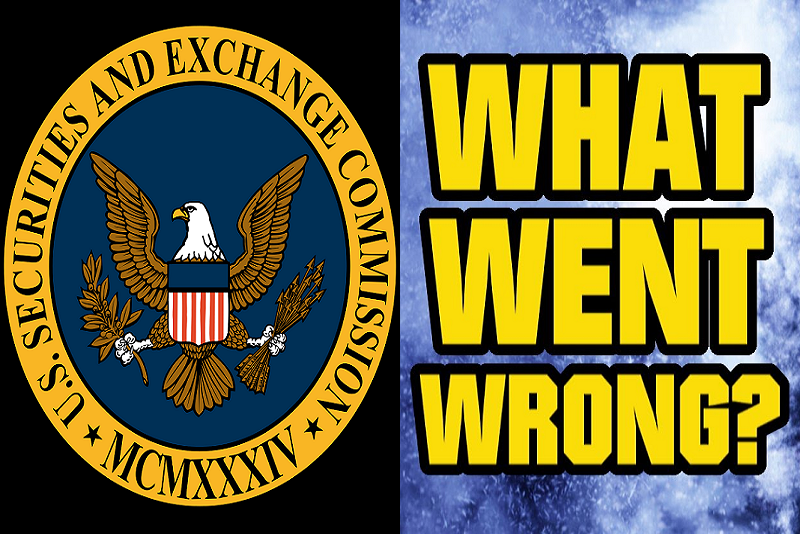BROWSE BY TOPIC
- Bad Brokers
- Compliance Concepts
- Investor Protection
- Investments - Unsuitable
- Investments - Strategies
- Investments - Private
- Features/Scandals
- Companies
- Technology/Internet
- Rules & Regulations
- Crimes
- Investments
- Bad Advisors
- Boiler Rooms
- Hirings/Transitions
- Terminations/Cost Cutting
- Regulators
- Wall Street News
- General News
- Donald Trump & Co.
- Lawsuits/Arbitrations
- Regulatory Sanctions
- Big Banks
- People
TRENDING TAGS
Stories of Interest
- Sarah ten Siethoff is New Associate Director of SEC Investment Management Rulemaking Office
- Catherine Keating Appointed CEO of BNY Mellon Wealth Management
- Credit Suisse to Pay $47Mn to Resolve DOJ Asia Probe
- SEC Chair Clayton Goes 'Hat in Hand' Before Congress on 2019 Budget Request
- SEC's Opening Remarks to the Elder Justice Coordinating Council
- Massachusetts Jury Convicts CA Attorney of Securities Fraud
- Deutsche Bank Says 3 Senior Investment Bankers to Leave Firm
- World’s Biggest Hedge Fund Reportedly ‘Bearish On Financial Assets’
- SEC Fines Constant Contact, Popular Email Marketer, for Overstating Subscriber Numbers
- SocGen Agrees to Pay $1.3 Billion to End Libya, Libor Probes
- Cryptocurrency Exchange Bitfinex Briefly Halts Trading After Cyber Attack
- SEC Names Valerie Szczepanik Senior Advisor for Digital Assets and Innovation
- SEC Modernizes Delivery of Fund Reports, Seeks Public Feedback on Improving Fund Disclosure
- NYSE Says SEC Plan to Limit Exchange Rebates Would Hurt Investors
- Deutsche Bank faces another challenge with Fed stress test
- Former JPMorgan Broker Files racial discrimination suit against company
- $3.3Mn Winning Bid for Lunch with Warren Buffett
- Julie Erhardt is SEC's New Acting Chief Risk Officer
- Chyhe Becker is SEC's New Acting Chief Economist, Acting Director of Economic and Risk Analysis Division
- Getting a Handle on Virtual Currencies - FINRA
ABOUT FINANCIALISH
We seek to provide information, insights and direction that may enable the Financial Community to effectively and efficiently operate in a regulatory risk-free environment by curating content from all over the web.
Stay Informed with the latest fanancialish news.
SUBSCRIBE FOR
NEWSLETTERS & ALERTS
Hedge Fund Adviser Fined $5Mn for Allowing Traders to Game Valuations
by Howard Haykin
A private fund manager in the mortgage-backed securities space will pay a $5Mn penalty to settle SEC charges that it failed to adopt and implement adequate compliance policies and procedures for properly valuing certain securities in its flagship hedge fund. The fund manager’s Chief Investment Officer (CIO) will pay a $250,000 penalty.
Deer Park Road Management Company is a Colorado-based RIA that primarily focuses on investments in distressed securities, largely through its flagship hedge fund, STS Partners Fund LP (“STS”). As of December 31, 2017, Deer Park managed over $2.5 billion in assets.
From 2009 through 2014, STS’ returns exceeded 20% each year, and from 2009, STS did not have a losing month for over 80 consecutive months, until around October 2015. Consequently, Deer Park during this period was ranked as one of the top and “most consistent performing” hedge funds in the country. It was during this time – and particularly from October 2012 through December 2015 (the “Relevant Period”) – that Deer Park drew many new investments into STS, and the fund’s assets under management grew from several hundred million dollars to more than $1.5 billion as the fund accumulated over 1,800 unique bonds into the STS portfolio.
WHAT WENT WRONG. That explosive growth and the desire to prolong the "monthly winning streak" appear to have played unwitting and intentional roles in Deer Park’s failure to accurately value the STS portfolio of investments.
- A significant number of securities in the STS portfolio were not valued using a 3rd party pricing vendor’s price, but instead priced by the CIO whose final valuations were based on traders’ preliminary assessments.
- Deer Park may have undervalued certain residential mortgage-backed securities (“RMBS”) in the STS portfolio by failing to maximize relevant observable inputs - e.g., trade prices - and instead utilizing traders’ contemporaneous explanations that included references to market activity at a higher price than the valuation and “sell[ing] for a profit when needed.”
- The CIO approved valuations that the traders flagged as “undervalued” with notations to “mark-up gradually.”
- Deer Park failed to guard against its traders’ providing inaccurate information to a pricing vendor and then using the prices it got back to value bonds.
- Deer Park’s Risk Management Committee (”RMC”), charged with overseeing valuation, was comprised of the principal’s relatives and others who lacked relevant expertise. For most of the Relevant Period, the RMC consisted of ...
- (i) the firm’s CCO (a former geochemist and brother-in-law of a portfolio manager with no relevant experience in bond valuation); (ii) the firm’s CFO (a former bookkeeper and tax accountant at a small accounting firm with no prior experience in bond valuation); and, (iii) another relative of the portfolio manager (an attorney with no expertise in bond valuation).
-
Section 206(4) makes it is unlawful for any investment advisor … to engage in any act, practice, or course of business which is fraudulent, deceptive, or manipulative. The Commission shall, for the purposes of this paragraph (4) by rules and regulations define, and prescribe means reasonably designed to prevent, such acts, practices, and courses of business as are fraudulent, deceptive, or manipulative.
-
Rule 206(4)-7 requires an investment advisory firm to adopt and implement written compliance policies and procedures, perform an annual review, and designate a Chief Compliance Officer (CCO).
[For further details on this case, click on SEC Order]





